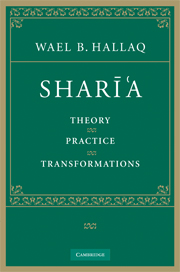Book contents
- Frontmatter
- Contents
- Preface and acknowledgments
- Introduction
- Part I The pre-modern tradition
- Part II The law: an outline
- Part III The sweep of modernity
- 13 The conceptual framework: an introduction
- 14 The jural colonization of India and South-East Asia
- 15 Hegemonic modernity: the Middle East and North Africa during the nineteenth and early twentieth centuries
- 16 Modernizing the law in the age of nation-states
- 17 In search of a legal methodology
- 18 Repercussions: concluding notes
- Appendix A Contents of substantive legal works
- Appendix B Chronology
- Bibliography
- Index
17 - In search of a legal methodology
Published online by Cambridge University Press: 05 June 2012
- Frontmatter
- Contents
- Preface and acknowledgments
- Introduction
- Part I The pre-modern tradition
- Part II The law: an outline
- Part III The sweep of modernity
- 13 The conceptual framework: an introduction
- 14 The jural colonization of India and South-East Asia
- 15 Hegemonic modernity: the Middle East and North Africa during the nineteenth and early twentieth centuries
- 16 Modernizing the law in the age of nation-states
- 17 In search of a legal methodology
- 18 Repercussions: concluding notes
- Appendix A Contents of substantive legal works
- Appendix B Chronology
- Bibliography
- Index
Summary
Introduction
Arguably, by the middle of the twentieth century the Sharīʿa had been reduced to a fragment of itself at best and, at worst, structurally speaking, to a nonentity. The chipping away by the modern state of the Sharīʿa resulted in: first, the collapse of the financial and waqf foundations that sustained the legal profession and its reproductive mechanisms; second, the gradual displacement of this profession by a class of modern lawyers and judges who came from a newly rising bourgeoisie and/or transformed ulama families; third, the replacement of institutional legal structures by modern law faculties and modern hierarchical courts of law; and fourth, the introduction of a massive bulk of commercial, criminal, civil and other laws that either replaced the fiqh or were imported in order to accommodate the new legal needs that arose as a result of exposure to the new and open international markets (whose props were industrialization and constantly evolving technologies, not the mercantile and agricultural substrates which largely defined the pre-modern Muslim economies). The totality of these effects, I have argued elsewhere, amounted to the effective structural demise of the Sharīʿa, notwithstanding the continuing viability of the law of personal status, which finds its roots in the fiqh but has become transformed in function and modality to a state law. The manner of Sharīʿa's functioning as well as the moral community that permitted and nourished its operation no longer exist.
- Type
- Chapter
- Information
- Sharī'aTheory, Practice, Transformations, pp. 500 - 542Publisher: Cambridge University PressPrint publication year: 2009



